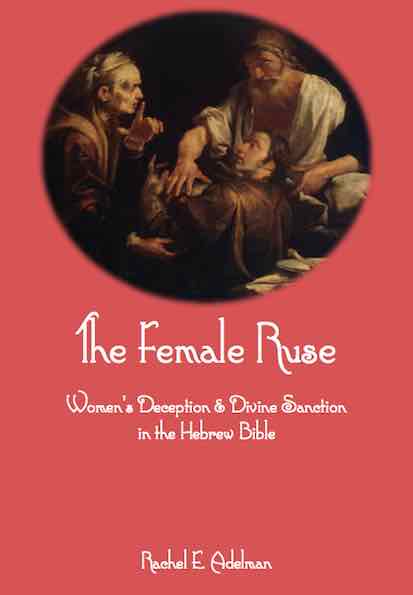The Female Ruse: Women’s Deception and Divine Sanction in the Hebrew Bible
Published: Sep 2017
Price range: £25.00 through £60.00
From Eve to Esther, the Hebrew Bible is replete with gendered tales of trickery. A lie is uttered, a mask donned, a seduction staged, while redemption is propelled forward, guided by the divine hand. From the first 'female ruse' — Eve presenting the fruit of the tree of knowledge to Adam — humanity becomes embodied, engaged in history, moving from the Garden to exile, from wandering to homeland and redemption (and back again). Consider Rebekah dressing her beloved son in goatskins to steal the blessing from his blind father; Lot's daughters lying with their drunken father, and then conceiving the founding fathers of Ammon and Moab; Leah and Rachel, the mothers of the twelve tribes of Israel, duping Jacob on their wedding night; Tamar's seduction of Judah, her father-in-law, who then bears the progenitor of the Davidic line; Naomi sending Ruth to the threshing floor to seduce Boaz by night; Bathsheba invoking an oath that King David had supposedly made in order to forward Solomon, her son, as successor to the monarchy; and Queen Esther concealing her Jewish identity in the Persian imperial court. Over the course of nine chapters, the author traces these narratives of deception; in each case, God is in cahoots with these feminine agents in advancing the providential plan. A tension holds between the 'best laid plans' of men and the divine will as forwarded by women. Drawing on classic rabbinic sources and modern literary exegesis, the author exposes the conflict between the simple progression of genealogies and the process of selection through alliances of family and kin. Women are at the crux of that conflict, seemingly compelled to choose the indirect route while the deity appears to endorse their lie.
The Female Ruse: Women’s Deception and Divine Sanction in the Hebrew Bible
Price range: £25.00 through £60.00
From Eve to Esther, the Hebrew Bible is replete with gendered tales of trickery. A lie is uttered, a mask donned, a seduction staged, while redemption is propelled forward, guided by the divine hand. From the first 'female ruse' — Eve presenting the fruit of the tree of knowledge to Adam — humanity becomes embodied, engaged in history, moving from the Garden to exile, from wandering to homeland and redemption (and back again). Consider Rebekah dressing her beloved son in goatskins to steal the blessing from his blind father; Lot's daughters lying with their drunken father, and then conceiving the founding fathers of Ammon and Moab; Leah and Rachel, the mothers of the twelve tribes of Israel, duping Jacob on their wedding night; Tamar's seduction of Judah, her father-in-law, who then bears the progenitor of the Davidic line; Naomi sending Ruth to the threshing floor to seduce Boaz by night; Bathsheba invoking an oath that King David had supposedly made in order to forward Solomon, her son, as successor to the monarchy; and Queen Esther concealing her Jewish identity in the Persian imperial court. Over the course of nine chapters, the author traces these narratives of deception; in each case, God is in cahoots with these feminine agents in advancing the providential plan. A tension holds between the 'best laid plans' of men and the divine will as forwarded by women. Drawing on classic rabbinic sources and modern literary exegesis, the author exposes the conflict between the simple progression of genealogies and the process of selection through alliances of family and kin. Women are at the crux of that conflict, seemingly compelled to choose the indirect route while the deity appears to endorse their lie.

